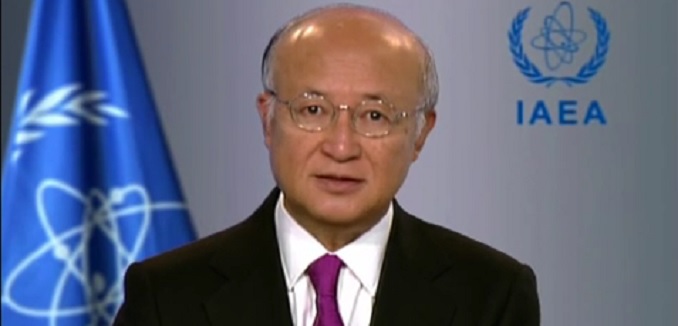The Associated Press on Monday conveyed comments from the head of the U.N.’s nuclear watchdog (IAEA) assessing that the pace being made in addressing the so-called possible military dimensions (PMDs) of Iran’s nuclear program – which stretch from the Iranian military’s involvement in mining uranium all the way to tests related to nuclear detonations – may end up hampering efforts to ink a comprehensive nuclear agreement into 2015.
The wire reported that IAEA chief Yukiya Amano had bluntly told journalists that the IAEA, which is seeking to gain transparency into the degree to which the Iranian military is entangled in Tehran’s atomic program, will not have concluded its probes by the time that the July 20 deadline set by the interim Joint Plan of Action (JPA) passes:
The U.S. and its western allies at the negotiating table insist that Iran and the IAEA must wrap up the investigation as part of the overall nuclear agreement that Iran and the powers want to finalize by July 20.
On Monday, IAEA chief Yukiya Amano told reporters he doesn’t believe either side expects his agency to conclude its probe by then — raising new doubts about the deadline. He could not say if the investigation would finish by year’s end.
Speaking to the 35-nation IAEA board, Amano said Iran is cooperating “substantively” with the probe, but it is too early to make an overall judgment.
The timeline is a function both of past Iranian opacity – Reuters referred to the IAEA’s “long-thwarted probe into suspected atom bomb research” in its writeup – and to ongoing Iranian foot-dragging on a variety of PMD-related issues.
Amano responded to suggestions that his agency’s work can be hastened:
“I can understand the expectation from many countries and people to accelerate the process, and I myself would like to see a speeding up,” Amano, the IAEA’s director general, told a news conference.
The PMD issue, which has for years been a core concern in the West’s approach to Iran, is considered critical to establishing a robust verification regime in the context of any deal between the P5+1 global powers and Iran.
Washington Institute Managing Director Michael Singh months ago gave a textbook rundown of the dynamic, concluding among other things that “[w]ithout insight into the full extent of Iran’s clandestine nuclear activities, no amount of monitoring and inspection can provide true confidence that Iran lacks a parallel program beyond inspectors’ view.”
[Photo: opcwonline / YouTube]




